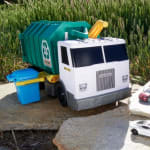
SABIC, a global leader in the chemicals industry, today announced a collaboration with Mattel, a leading global toy company, to incorporate certified renewable polymers from SABIC’s TRUCIRCLE program across Mattel’s products offering. The first Mattel toy products to enter the market in 2022 using certified renewable SABIC PP (polypropylene) polymers will be from MEGA and Matchbox, with more to follow.
Heading the initiative will be MEGA BLOKS Green Town, the first-ever toy line available at mass retail to be certified CarbonNeutral. These new construction playsets, including the Grow & Protect Farm and the Build & Learn Eco House, embrace the sustainable material choice and help teach kids green behaviors. From the Matchbox brand, all Action Driver playsets and the Matchbox Recycling Trucks contain SABIC materials, which supports the brand’s Driving Toward a Better Future initiative, to make all Matchbox die-cast cars, playsets and packaging with 100% recycled, recyclable or bio-based plastic materials by 2030, in line with Mattel’s corporate goal.
“The collaboration with Mattel is an important step in providing our customers with materials that can help lower their carbon footprint across a wide range of consumer markets, and Mattel serves as a pioneer in the toy industry,” says Lada Kurelec, General Manager for PP & E4P Business, SABIC. “Our materials from renewable sources facilitate the change-over from existing fossil-based applications without compromise on purity and quality. We are happy to establish such a good cooperation with Mattel and create value with more sustainable material choices through our TRUCIRCLE portfolio.”
Mattel is the first company in the toys market to work with SABIC in a mass balance approach designed to return second-generation renewable feedstock into high-quality new plastic applications. The partnership directly supports Mattel’s goal to achieve 100% recycled, recyclable or bio-based plastic materials in its products and packaging by 2030, and is an important step forward in their transition towards a circular economy.
“As a global leader in the toy sector, we strive to develop innovative products that are better for our planet by integrating sustainable materials and principles of product stewardship and circular design,” states Pamela Gill-Alabaster, Head of Global Sustainability at Mattel. “Aligned with our strategy, this new partnership with SABIC will allow us to be first to market with products made from ISCC certified renewable feedstock that has a lower carbon footprint but the same quality and safety as products made with traditional virgin plastics.”
SABIC’s certified renewable polymers include various polypropylene and polyethylene materials derived from second generation renewable feedstock, that are not in direct competition with human food and animal feed production. A cradle-to-gate lifecycle analysis has confirmed their superior sustainability, concluding that each kg of the company’s bio-based resins reduces CO2 emissions by an average of 4 kg as compared to fossil-based virgin alternatives, while at the same time cutting fossil depletion by up to 80 percent. In addition, these plant-based materials facilitate the change-over from existing fossil-based applications without compromises on purity, quality, safety or convenience.
The sustainability of SABIC's certified renewable polymers is validated using a mass balance approach under the widely recognized International Sustainability & Carbon Certification (ISCC PLUS) scheme. Mass balance is determined to allocate the renewable content used in production and conversion of the plastic material to the ultimate application. In addition, the certification also provides traceability throughout the partners’ entire supply chain from the feedstock to the final product.
SABIC’s certified renewable polymers form part of the company’s TRUCIRCLE portfolio and services for circular solutions. The offering also includes design for recyclability, mechanically recycled products, certified circular polymers and closed loop initiatives to recycle plastic back into high quality applications and help prevent valuable used plastics from becoming waste.



